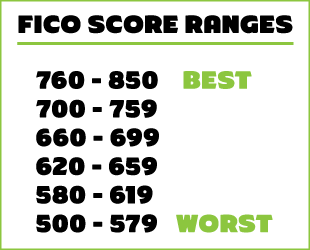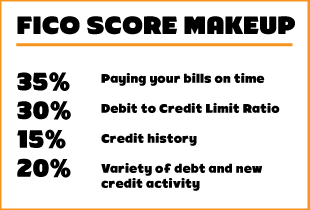You’ve done the research and know that buying a home is the best big-ticket purchase you will ever make, so what’s next?
Buyer Boot Camp #1: Check your credit score.
A FICO score is a three-digit number that determines the interest rate you will pay on your credit cards, car loan, home mortgage, and is connected to just about every part of your life. The higher your credit score the lower your interest rate will be. The real estate world sees your FICO score as the determining factor of whether or not you are able to handle a new loan.
There are three big credit bureaus out there: Equifax, Experian, and TransUnion. You need to check your score with all three because each credit bureau receives information from different sources, for example one may not get the report from your cell phone provider, while two others may receive the report from a credit card. Many credit reporting sites allow consumers a free credit report, and will include scores from all three, just be sure to cancel after one month so you don’t get charged a fee.
 If your score is below 660 you have some work to do before you will be approved for a mortgage. Look your reports over carefully for mistakes or fraudulent charges, 79% of reports contain mistakes that can be cleared up by contacting the credit bureau. Be patient, this process can take some time to resolve.
If your score is below 660 you have some work to do before you will be approved for a mortgage. Look your reports over carefully for mistakes or fraudulent charges, 79% of reports contain mistakes that can be cleared up by contacting the credit bureau. Be patient, this process can take some time to resolve.
The best way you can improve your score is to pay all of your bills on time, all of the time. 35% of your FICO score is determined by whether or not you pay your bills on time. Even if you can only afford to pay the minimum, if you pay on time you are on the right track. Just one late payment can screw up all of your hard work. To protect yourself set reminders in your calendar of due dates, or sign-up for automatic payments.
The next best thing is to pay off your credit card debt. Another 30% of your FICO score is a reflection of your debt-to-credit limit-ratio. Your debt is the sum of all of your credit card balances, and installment loans. Your credit is the limit you are allowed to spend on all of your credit cards combined. Lenders will assess your ability to keep up with a monthly mortgage payment. If your debt-to-credit-limit ratio is high then the concern is that you are not able to keep up with your debt. Do your best to pay down your credit cards and ask card companies to boost your credit limit. Cancelling a credit card will lower your overall credit limit so consider simply cutting up or hiding the card if you’re afraid you’ll be tempted to overuse it.
The next 15% of your FICO score is determined by your credit history. You may have been financially responsible for years without ever using a credit card but if a credit card wasn’t tracking your purchases and your payments there is no record of your good financial habits. Lenders want to know you can be financially responsible over the long-term and a long credit history will show a good summary of your money-managing habits.
The final 20% of your FICO score is determined by the mix of the kinds of debt you have and how much new credit activity has been going on. If lenders see that you are able to pay your credit cards, auto loan and retail cards on time they will see a consumer who can manage a variety of responsibility. Do your best not to open up any new credit cards, or make a big purchase within one year of buying a house. Too many credit inquiries can have a negative effect on your score. Maintaining a low balance on your credit cards in the months leading up to buying a home is a good strategy.
Getting your credit score under control may take some time, be patient and persevere. If you can show that you are consistently responsible with managing your money then you are ready to buy a home.
Next: Buyer Boot Camp #2








